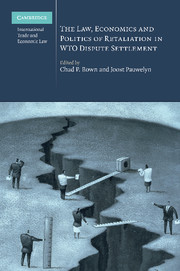Book contents
- Frontmatter
- Contents
- List of tables and figures
- Contributors
- Introduction: trade retaliation in WTO dispute settlement: a multi-disciplinary analysis
- PART I Background and goal(s) of WTO retaliation
- PART II A legal assessment after ten arbitration disputes
- PART III An economic assessment after ten arbitration disputes
- PART IV The domestic politics and procedures for implementing trade retaliation
- 8 The United States' experience and practice in suspending WTO obligations
- 9 The European Community's experience and practice in suspending WTO obligations
- 10 The politics of selecting trade retaliation in the European Community: a view from the floor
- 11 Canada's experience and practice in suspending WTO obligations
- 12 Is retaliation useful? Observations and analysis of Mexico's experience
- 13 Procedures for the design and implementation of trade retaliation in Brazil
- 14 Retaliation in the WTO: the experience of Antigua and Barbuda in US–Gambling
- PART V Problems and options for reform
- PART VI New frontiers and lessons from other fields
- Index
14 - Retaliation in the WTO: the experience of Antigua and Barbuda in US–Gambling
Published online by Cambridge University Press: 26 February 2010
- Frontmatter
- Contents
- List of tables and figures
- Contributors
- Introduction: trade retaliation in WTO dispute settlement: a multi-disciplinary analysis
- PART I Background and goal(s) of WTO retaliation
- PART II A legal assessment after ten arbitration disputes
- PART III An economic assessment after ten arbitration disputes
- PART IV The domestic politics and procedures for implementing trade retaliation
- 8 The United States' experience and practice in suspending WTO obligations
- 9 The European Community's experience and practice in suspending WTO obligations
- 10 The politics of selecting trade retaliation in the European Community: a view from the floor
- 11 Canada's experience and practice in suspending WTO obligations
- 12 Is retaliation useful? Observations and analysis of Mexico's experience
- 13 Procedures for the design and implementation of trade retaliation in Brazil
- 14 Retaliation in the WTO: the experience of Antigua and Barbuda in US–Gambling
- PART V Problems and options for reform
- PART VI New frontiers and lessons from other fields
- Index
Summary
The experience of Antigua and Barbuda (Antigua) with the sanctions process at the World Trade Organization (WTO) has been, like all other aspects of its dispute with the United States over the cross-border supply of gambling and betting services (US–Gambling), very much a mixed bag. This chapter will briefly summarise Antigua's experience, assess the efficacy of the system and posit some important questions for dispute resolution at the WTO going forward.
The award of the arbitrators
As was true with other reports and decisions in this case, the award of the arbitrators in the arbitration under Article 22.6 of the DSU bears many of the features of an essentially political approach to what should have been a relatively straightforward application of WTO legal principles to a largely undisputed body of facts. Although the United States stridently contested the factual basis for the Antiguan claimed level of nullification and impairment, a careful review of all materials submitted makes it clear that Antigua's evidence was not met by any substantive contrary evidence.
The arbitrators nonetheless made a number of unsupported assumptions and tenuous conclusions in order to trim Antigua's claim from billions of dollars down to the low hundreds of millions.
- Type
- Chapter
- Information
- Publisher: Cambridge University PressPrint publication year: 2010



